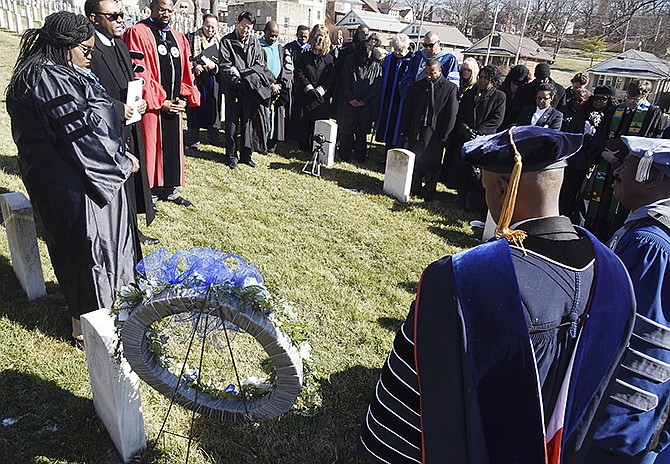Lincoln University celebrates its 150th anniversary this year.
In September 1866 - 19 years after Missouri lawmakers said it was illegal to teach slaves and other Negroes how to read and write - two black students started classes on the side of Jefferson City's Hobo Hill.
They began going to that school because months earlier - in January and February 1866 - soldiers in the Missouri 62nd and 65th Colored Infantry units decided to start the school while they were in Texas, waiting to get out of the Army after the Civil War's end.
Those black soldiers had begun to learn how to read and write during the war, with help from their white officers.
And they pledged money - in some cases more than a year's salary - to pay to start that school.
"Even the most outdated spaces on our campus have no comparison to learning around the flickering light of a campfire," Curators President and 1967 LU graduate Don Cook said Thursday morning during the 150th Founders' Convocation in Lincoln's Mitchell Auditorium.
"The fight we have for adequate funding is nothing like the struggles the (founding soldiers), and Lt. Richard Baxter Foster, met in just getting someone to actually take their money to start Lincoln Institute."
As the school's first principal, Foster wrote the first classes began in a dilapidated wood building with holes in the walls large enough "to throw a hound dog through."
Before the Civil War, that building - overlooking Wear's Creek from the side of the hill where Simonsen 9th Grade Center now sits - was the first home of Jefferson City's Public Schools.
In 1871, classes moved to the present site.
"Who would have thought, 150 years ago, that Lincoln would turn out to be this great institution that we all love? LU President Kevin Rome told the Convocation."It just shows us what love for mankind can do, and the impact is everlasting."
In his keynote address, the Rev. Lee Clayton Goodman noted the founders had three stipulations for the new school's operations.
Senior pastor of St. John AME Church, St. Louis, and a 1982 Lincoln graduat, Goodman said he learned the stipulations while he was a student, working in the Page Library and reading some of the school's old history books.
"The institution shall be designed for the specific benefit of the freed blacks," Goodman said. "It shall be located in the state of Missouri.
"Its fundamental idea shall be to combine labor and study."
He reminded the Convocation audience Lincoln began "at a time when it was difficult to start a grocery store on a corner."
And, he said: "Well over 150 years before young people around this nation began to espouse the phrase, "Black Lives Matter,' these soldiers by their actions were echoing in no uncertain terms that all lives do matter."
After Lincoln was established, Foster wrote he first tried to start the new school in St. Louis, then one of the nation's largest cities.
But he found no support for a school intended to educate freed slaves.
Shifting his sights to the state capital, he again ran into resistance, but determined to start the school anyway.
Goodman, who is a lawyer as well as a preacher, wondered what kept Foster and the soldiers going when faced with almost constant adversity.
"How did the dream survive?" he asked. "How did they make it?"
"How do a people come from such a time as slavery - disenfranchised, not considered a person but an animal - how do they get over all of this?"
Like the people of Israel after their time of slavery in Egypt, the American slaves and their descendants - including Lincoln University's founding soldiers, Goodman explained, "When challenged and tested, they stayed the course and maintained a faith in God that brought them through times that are best forgotten."
Cook wondered if today's Lincoln students, faculty, staff and alumni ever can say thank you enough to those soldiers.
The statues and monument in the Quadrangle serve as one daily reminder of the founders' legacy, he said.
And the annual Founders' Day program is another.
Also Thursday, the school renewed a tradition set aside in recent years - laying a wreath at W. Logan Bennett's grave.
Bennett was one of those founding soldiers, writing a $10 check in 1866 to help start that school that became Lincoln University.
Following the Convocation program, LU police escorted vans and cars in a caravan from Lincoln to the Jefferson City National Cemetery.
Blue Tiger ROTC members posted colors and stood at attention around Bennett's gravesite.
About 50 dignitaries, professors, administrators and students gathered at the cemetery for the brief ceremony.

